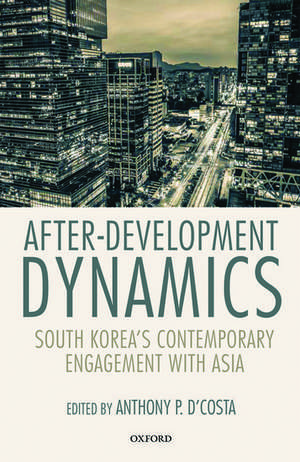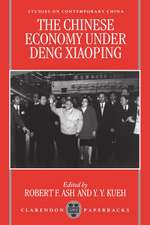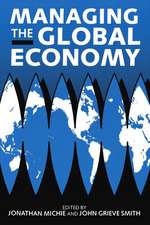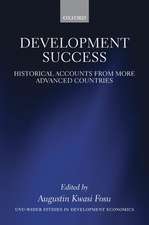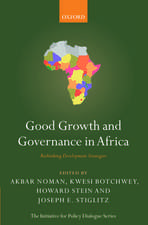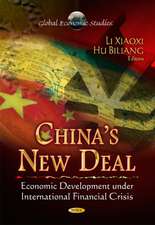After-Development Dynamics: South Korea's Contemporary Engagement with Asia
Editat de Anthony P. D'Costaen Limba Engleză Hardback – 30 iul 2015
Preț: 704.79 lei
Preț vechi: 1009.38 lei
-30% Nou
Puncte Express: 1057
Preț estimativ în valută:
134.88€ • 140.30$ • 111.35£
134.88€ • 140.30$ • 111.35£
Carte tipărită la comandă
Livrare economică 04-10 aprilie
Preluare comenzi: 021 569.72.76
Specificații
ISBN-13: 9780198729433
ISBN-10: 019872943X
Pagini: 308
Ilustrații: 8 Figures and 32 Tables
Dimensiuni: 172 x 240 x 25 mm
Greutate: 0.75 kg
Editura: OUP OXFORD
Colecția OUP Oxford
Locul publicării:Oxford, United Kingdom
ISBN-10: 019872943X
Pagini: 308
Ilustrații: 8 Figures and 32 Tables
Dimensiuni: 172 x 240 x 25 mm
Greutate: 0.75 kg
Editura: OUP OXFORD
Colecția OUP Oxford
Locul publicării:Oxford, United Kingdom
Recenzii
The South Korean economy has long since moved beyond the stage of catch-up growth where development strategy mostly follows paths pioneered by others. Today South Korea is facing a variety of new challenges that call for unique solutions particularly in the international sphere. This volume edited by Anthony D'Costa includes a collection of stimulating essays on how Korean businesses, the government, and the population are responding to these challenges. The emphasis is particularly strong on how government and businesses are responding to efforts to expand economic relations abroad and with the increasing numbers of foreign professionals, students, and migrants in Korea. Anyone interested in understanding the international challenges Korea is facing today, and in the near future, will benefit from these studies.
Considerable scholarship has explored Korea's phenomenal economic growth since the 1970s. In this volume, D'Costa and his collaborators take a powerful next step by exploring how Korean companies are now tackling the more welcome, but still arduous, tasks of consolidating past gains, and moving beyond success at the national level in the quest for an enhanced regional and global presence. Individual chapters address these problems for a sequence of separate industries and problem areas, collectively providing a rich and nuanced portrait of one of the OECD's most dynamic economies.
A valuable new addition to the field of Korea studies! Professor Anthony D'Costa and the contributors to this volume provide a completely new dimension to the field by focusing on Korea's after-development with an interdisciplinary approach. Students of development studies and development policy makers will greatly benefit from this unique volume.
Considerable scholarship has explored Korea's phenomenal economic growth since the 1970s. In this volume, D'Costa and his collaborators take a powerful next step by exploring how Korean companies are now tackling the more welcome, but still arduous, tasks of consolidating past gains, and moving beyond success at the national level in the quest for an enhanced regional and global presence. Individual chapters address these problems for a sequence of separate industries and problem areas, collectively providing a rich and nuanced portrait of one of the OECD's most dynamic economies.
A valuable new addition to the field of Korea studies! Professor Anthony D'Costa and the contributors to this volume provide a completely new dimension to the field by focusing on Korea's after-development with an interdisciplinary approach. Students of development studies and development policy makers will greatly benefit from this unique volume.
Notă biografică
Anthony D'Costa has published on the political economy of development, global capitalism, and industrial restructuring using the steel, auto, and IT sectors. In 2012 his edited books Transformation and Development: The Political Economy of Transition in India and China (with A. Bagchi) and Globalization and Economic Nationalism in Asia were published by OUP. He has held several fellowships, including Fulbright-Hays, Korea Foundation, Abe, and POSCO at the East West Center. He teaches at the University of Melbourne and has taught at the University of Washington, Copenhagen Business School, and the National University of Singapore.
